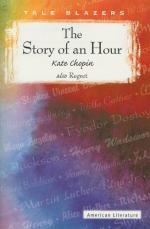|
This section contains 280 words (approx. 1 page at 300 words per page) |
"The Story of an Hour": What if Mrs. Mallard Had Lived?
Summary: A possible scenario of what the future of Mr. and Mrs. Mallard from "The Story of an Hour" would be like if Mrs. Mallard had lived, based on her thoughts during the hour in which she believed her husband had died.
The future for the Mallards might have been more difficult and confusing if Mrs. Mallard had lived. After hearing of her husband's death, Mrs. Mallard began to think of life without a husband, a "free, free, free" life (Chopin 784). Although she had loved her husband, at times, she felt that now she could live a life of her own--"she would live for herself"--instead of having someone "live for her" (Chopin 785). Since Mrs. Mallard has all these new and intense feelings, when her husband returned, clearly not dead, she would have to subdue those feelings of freedom and once again "she would have" someone to "follow her" (Chopin 784). However, these feelings of a great joy and freedom are difficult to suppress and most probably, these feelings would conflict with her husband's feeling of superiority. Mr. Mallard would no longer be the "undisputed head of the household" (The Language of Literature 783) because Mrs. Mallard would want input on important decisions. Mrs. Mallard is expected to be supported by Mr. Mallard, but her new found freedom and a "body and soul free" of these restrictions placed upon women through custom and law, would now be disputed. If Mrs. Mallard had not died, she would have many conflicts with Mr. Mallard concerning her position in their relationship and in society. She would possibly want to work or participate in other activities apart from bearing and tending to children while maintaining the household and preparing dinner. Mrs. Mallard possessed "self-assertion", which was the "strongest impulse of her being" and therefore, her future with Mr. Mallard would contain many arguments and disagreements concerning her role as a woman in the nineteenth century.
|
This section contains 280 words (approx. 1 page at 300 words per page) |


